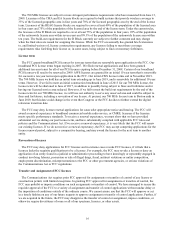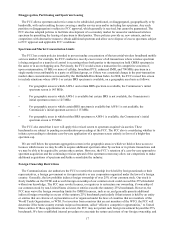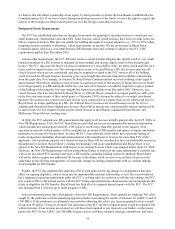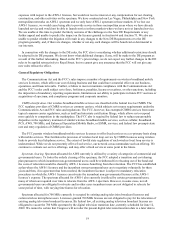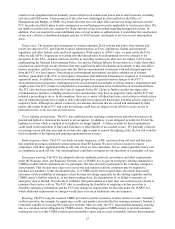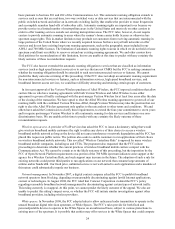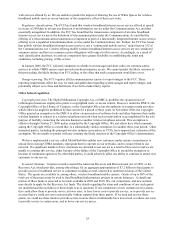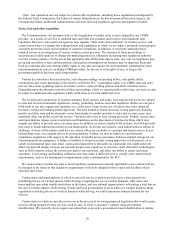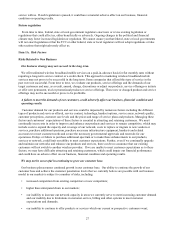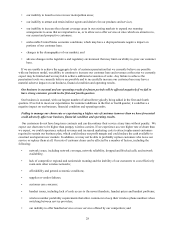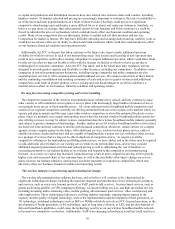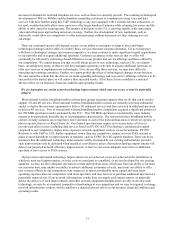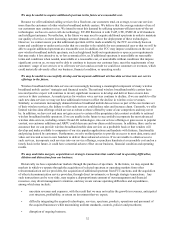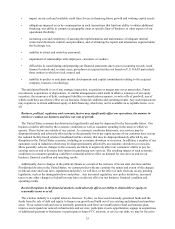Metro PCS 2008 Annual Report Download - page 33
Download and view the complete annual report
Please find page 33 of the 2008 Metro PCS annual report below. You can navigate through the pages in the report by either clicking on the pages listed below, or by using the keyword search tool below to find specific information within the annual report.24
basis pursuant to Sections 201 and 202 of the Communications Act. This automatic roaming obligation extends to
services such as ours that are real-time, two-way switched voice or data services that are interconnected with the
public switched network and utilize an in-network switching facility that enables the provider to reuse frequencies
and accomplish seamless hand-offs of subscriber calls. Automatic roaming rights are important to us because we
provide service in a limited number of metropolitan areas in the United States and must rely on other carriers in
order to offer roaming services outside our existing metropolitan areas. The FCC rules, however, do not require
carriers to provide automatic roaming to areas where the roamer’s home carrier holds licenses or otherwise has
spectrum usage rights. This in-market limitation may preclude our customers from receiving automatic roaming in
large portions of the United States where we recently acquired licenses but have not yet built networks or offer
services and do not have existing long-term roaming agreements, such as the geographic areas included in our
AWS-1 and 700 MHz licenses. The limitation of automatic roaming rights to areas in which we do not hold or lease
spectrum could limit our ability to renew or extend our existing roaming agreements. We and other carriers have
filed petitions for reconsideration of this limitation, but we are unable at this time to predict with any certainty the
likely outcome of these reconsideration requests.
The FCC also has not extended the automatic roaming obligation to services that are classified as information
services (such as high speed Internet services) or to services that are not CMRS but the FCC is seeking comment on
whether the roaming obligation should be extended to such non-interconnected services or features. We cannot
predict the likely outcome or timing of this proceeding. If the FCC does not adopt an automatic roaming requirement
for non-interconnected services or features, such as information services, high speed broadband services, and
broadband Internet access services, we could have difficulty attracting and retaining certain groups of customers.
In its recent approval of the Verizon Wireless purchase of Alltel Wireless, the FCC imposed conditions that allow
carriers like us who have roaming agreements with both Verizon Wireless and Alltel Wireless to use either
agreement to govern all traffic exchanged with the post-merger Verizon Wireless for at least four years after the date
of the closing of the transaction. We have opted to elect the Alltel Wireless roaming agreement to govern all of our
roaming traffic with the combined Verizon Wireless-Alltel, though Verizon Wireless may take the position that our
right to elect the Alltel Wireless agreement only applies to the rate and not to other terms and conditions. We and
others have asked the Commission to clarify these requirements, to extend the four-year commitment to seven years
and to require post-merger Verizon Wireless to offer automatic roaming for data services and features on a non-
discriminatory basis. We are unable at this time to predict with any certainty the likely outcome of these
reconsideration requests.
Wireless open access. A provider of VoIP services has asked the FCC to issue a declaratory ruling that would
give wireless broadband mobile customers the right to utilize any device of their choice to access a wireless
broadband mobile network as long as the device did not cause interference or network degradation and the FCC has
placed this request on public notice. The petition also seeks to enable customers to run applications of their choice
on wireless broadband mobile networks. This so-called “Wireless Carterfone Rule” is opposed by many wireless
broadband mobile companies, including us and CTIA. The proponent also requested that the FCC initiate
proceedings to determine whether the current practices of wireless broadband mobile carriers comport with the
Communications Act. We cannot be certain as to the likely outcome of this proceeding, but the imposition by the
FCC of Open Network Platform requirements on a portion of the 700 MHz spectrum indicates some support at the
agency for a Wireless Carterfone Rule, and such support may increase in the future. The adoption of such a rule for
existing networks could permit third parties to run applications on our network that consume large amounts of
airtime and/or bandwidth. Our fixed price, unlimited service is not well-suited to such applications and a mandate of
this nature could substantially impede our business.
Network management. In November 2007, a digital content company asked the FCC to prohibit broadband
network operators from blocking, degrading or unreasonably discriminating against lawful Internet applications,
context or technologies. In August 2008, the FCC ruled that Comcast Corporation violated the FCC’s policy
regarding reasonable broadband network management by discriminating against certain types of network traffic.
This ruling currently is on appeal. At this point, we cannot predict the likely outcome of the appeal. We also are
unable to predict this ruling’s impact on us, or whether the FCC will initiate similar investigations against other
broadband providers, including wireless providers.
White spaces. In November 2008, the FCC adopted rules to allow unlicensed radio transmitters to operate in the
unused broadcast digital television spectrum, or White Spaces. The FCC’s rules provide for both fixed and
personal/portable devices to operate in the White Spaces on an unlicensed basis, subject to various protections to
existing users of the spectrum. It is possible that entities may offer services in the White Spaces that could compete




